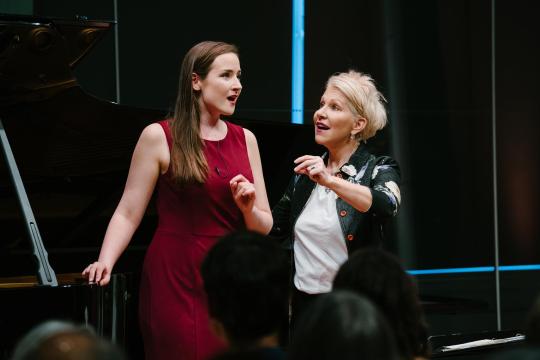#Operavore
Note
Rant about something that's been annoying for the asks?
Something I've been mulling over in my mind, as I've been going over an old oneshot that I've been considering for years:
Everyone is very attached to this...Idea of Nannerl Mozart -- it's easy to find countless articles on the internet about how she was the more intelligent Mozart, that she was more musically gifted than Wolfgang, bemoaning her wasted potential, treating her life as a tragedy, with a group of what Operavore called "Nannerlologists", people who are invested in the Idea of Nannerl Mozart, or what she represents.
And I'm going to emphasize that...I get how this comes about. I do think that Nannerl SHOULD have had the chance to be great, I think that she DID have the potential to have been as famous as her brother, in a better world, but...it's so easy to find articles upon articles about her missing music, her stillborn career as an artist, her seemingly arranged marriage to a man decades her senior, but next to nothing about her concert piano playing for Fürst Ernst von Schwarzenberg in her later years. Nothing about her music lessons in her widowhood.
People want to focus so much on the tragedy of her life, and I do believe there was a tragedy, but...I prefer the story, personally, of how despite all that, she kept her music with her all her life. (What I'm also curious about is...how much of her music not surviving WAS the result of the Evil Men in her life, how much was, potentially, her own choice? Again, I'm not going to DEFEND Leopold Mozart, the man can rot at the lowest circle of Hell for all I care, but I do think it's interesting that she lived to old age, well after both her father and husband's deaths, more than enough time to write music if she wanted to, and yet she didn't, or try to publish it -- this indicates, to me at least, that...perhaps she didn't want to. We assume that she would have wanted Wolfgang's fame or his career, what if she didn't? Or what if she was tired? Or what if she didn't want to risk society?) Despite everything in her life, despite the deaths of her father, brother, husband, despite the deaths of two of her children, despite never having the ability to have a career in it like her brother, she never lost it, she never forgot it.
15 notes
·
View notes
Text
From the Archives: George Shirley Interviews Marian Anderson | Operavore | WQXR
0 notes
Text
Operavore: Why do I sing?

Whether you are an opera singer, professional singer of some other kind, or perhaps are in a chorus or only a shower singer, we all experience a physical and emotional surge when we sing. Yet we don’t always pause to reflect on this.
In April I attended one of Joyce DiDonato’s wonderful master classes at the Weill Education Center of Carnegie Hall. I had been thinking about the question of “Why do I sing?” when I read the program and discovered that DiDonato had asked each applicant to write a brief essay on that very topic as part of their application process.
Soprano Alexandra Nowakowski wrote, in part, “I sing for my mom. Thirty years ago, my parents came to America with $30 in their pockets. … My mom had nothing but hope when she came to America. She passed that hope along to me when I decided to pursue singing, and for that I will owe her my career.”
Tenor Aaron Crouch wrote, “My favorite thing about being a singer is being a communicator. I truly believe that music is the universal language. My goal is to always have some sort of effectiveness through my singing — whether that comes in the form of tears, laughter, or simply a smile. It’s not about the high notes or the fast notes. It’s about being vulnerable and having something to say to people. That is why I sing.”
American soprano Madelyn Renée, who has been based in Italy for many years, told me, “Singing is a transformative experience in that it unites the physical, emotional, and spiritual part of us. As our most important means of communication, our voices convey all of our emotions: joy, sorrow, anger, fear, etc. When we sing, we are connected to our respiratory system, and the outpouring of sound is a healthy way to relieve stress and calm the mind and body, engendering a sense of harmony and well-being. As a singer, it is what I love to do best. It brings me back to myself and I always feel like a new person after a good sing! As Ella Fitzgerald always said, ‘The only thing better than singing is more singing!’”
The excellent South African bass-baritone Musa Ngqungwana is as eloquent a writer as he is a singer. He is the author of Odyssey of an African Opera Singer, a candid account of having responsibility for a mighty gift (his voice) that has given him joy, but also of the many challenges he has had along the way. In the book and a recent social media post, he spoke of “how writing and singing saved me from depression as they became my free therapeutic tools and sessions.”
What I have come to love is the way people sing together. In fractious, difficult times such as ours, hearing and seeing people achieve harmony through listening to one another is a model we should all try to emulate.
There are some countries in the world that I think of as singing nations. These are often places that have been subjected to repression. Estonia is such a place. Between 1987 and 1991 its people waged what was known as the Singing Revolution, which included acts of defiance that were often incorporated into singing by individuals or crowds of hundreds of thousands. I first visited there in 1979 when it was part of the Soviet Union. I came to know brothers Toomas and Tarmo Urb, who courageously merged voices in their own language at time when that was dangerous.
Estonians still gather to sing songs such as “Tuljak," which gives them an opportunity to share identity and revel in their language, and had been suppressed by the Soviets and other occupiers. To sing in this way, for Estonians, is to breathe as one.
One of my favorite examples of how singing unites people is of male and female firefighters who went from South Africa to Canada to help put out huge fires. They used music to form a remarkable bond of solidarity.
Sometimes music of identity is performed by groups of only one gender. South Africa’s all-male Ladysmith Black Mambazo exemplifies the deepest expression of self and of identity with its singing, whether in unison, harmony, counterpoint, or call and response. The women’s choruses of Bulgaria have achieved a huge worldwide following.
In the United States, singing has a long tradition of resistance and affirmation. Sam Cooke sang in many genres. He is famous for his powerful solo rendition of “A Change is Gonna Come." Cooke began as the lead singer of The Soul Stirrers, a gospel group that harmonized beautifully. They often performed a cappella or with minimal instrumental accompaniment. Listen to them and think about how they use their voices as instruments.
Pete Seeger’s classic song “If I Had a Hammer” was first recorded by The Weavers (with Seeger) in 1949. Peter, Paul and Mary did a famous version in 1963. Sam Cooke sang it solo, and soulfully, in 1964.
Each version of this song is deeply moving and emotional for different reasons. The lyrics are eloquent in their simplicity, but also for the power they wield. The melody, too, is simple and sweet, but it accommodates the words and allows each person who sings it (and hears it) to feel a special glow. It is the magic of this song that makes one feel happy and connected to others when singing it.
As I was completing this article, I happened to attend a new work, Octet, by Dave Malloy at Signature Theater, described as a chamber choir musical. Eight superb performers, with voices ranging from soprano to bass, play participants in a support group for people who have difficulty coping with the impact of communications technology in the 21st Century. So beautiful is the music and so sublime were their a cappella performances that I almost found the words pedestrian and intrusive, even though they were meaningful.
One of the simplest and most eloquent expressions of why we sing was also one of the first I encountered, in the film version of Carson McCullers’ The Member of the Wedding, in which Ethel Waters consoles two distraught children by singing the gospel song “His Eye is on the Sparrow.” You might wish to watch the whole video, which includes the scene leading up to the song, which starts at 6:40. The words and music say it all: “I sing because I’m happy. I sing because I’m free.”
9 notes
·
View notes
Photo

Var på øverommet HELE dagen og endte opp på operavors før Pauls og Stry til klokken 7, 04/03/17
1 note
·
View note
Text
Rise and grind
Caramel macchiato
Mixed salad bowl for lunch
Operavore
Violin porn
12 hr work
All set for the basic white girl comments
0 notes
Text
Operavore · A. Pappano and M. Horne on Favorite Wagnerians
Operavore · Antonio Pappano and Marilyn Horne on Favorite Wagnerians · via wqxr.org
0 notes
Text
If you haven't listened to the Horne-DiDonato discussion about opera, you're not doing something right
http://www.wqxr.org/#!/programs/operavore/2013/feb/09/?utm_source=local&utm_media=treatment&utm_campaign=carousel&utm_content=item0
12 notes
·
View notes